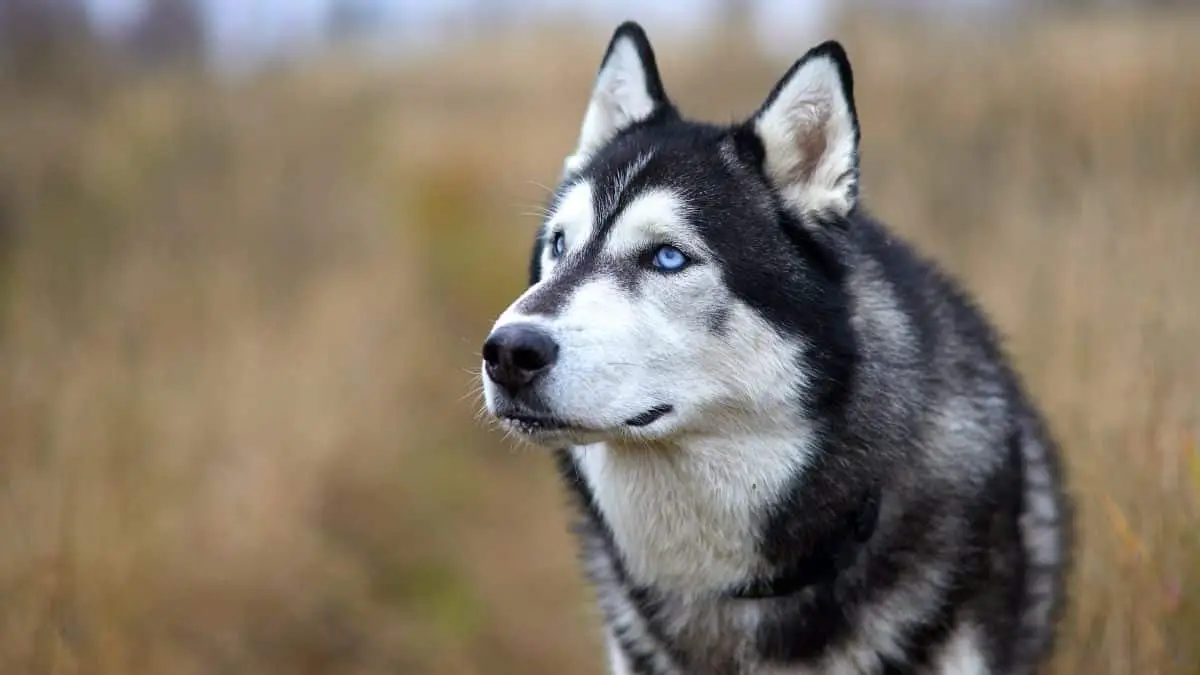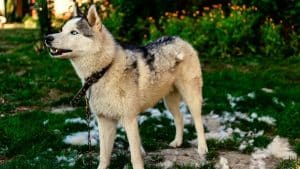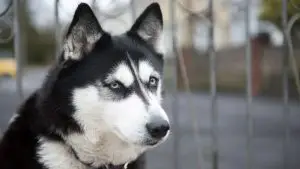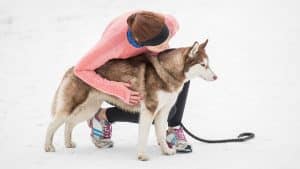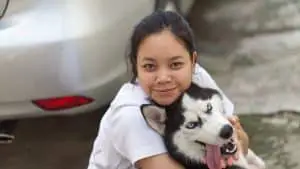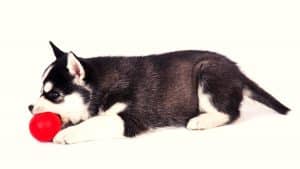Siberian Husky Behavior And What To Expect
Successfully keeping a Siberian Husky requires a committed owner who is well armed with all the necessary information about the Siberian Husky breed. This includes awareness and understanding of the typical character and behavioral traits that typify these dogs.
A better understanding of your Husky’s behavior can help you become a better owner in a variety of ways. From devising effective training programs and knowing your dog’s exercise requirements to seeing their unique character quirks and reading their body language, a proper understanding of your Husky will help you live a long and happy life together.
Although they are good family dogs, it is important to remember that Huskies are a high energy breed and were originally bred to be working dogs. They may not be suitable for every household and every family, so ensure you familiarize yourself with the unique needs and behaviors of Huskies before you commit to buying one.
Table of Contents
The Basics: What to Expect From your Siberian Husky
An active and energetic breed, these dogs originated from the Arctic area we know today as Siberia. Bred by the Chukchi people as both a medium-size working dog and a companion animal, Siberian Huskies were primarily used as sled dogs, perfect for battling their native climate’s harsh conditions.
Energetic escape artists
As a result of their breeding, Husky dogs have a very high energy level and are known for their boisterous, fun-loving, and outgoing natures. Their dual role as a companion animal also means they are also very affectionate and will be loyal family pets.
While Siberian Huskies are known for their intelligence and independence, they are also pack dogs at heart and need companionship. If you work all day, it is advisable to get another pet, as your Husky may begin to exhibit destructive behaviors if they become bored and listless.
This is typical Siberian Husky behavior, as they do not like being alone and do not like confinement. They also have a habit of digging and may ruin your landscaped yard in an attempt to burn off some energy!
With a reputation as accomplished escape artists, Huskies will need to be kept in a yard with a high fence for their own safety. They are fearless adventurers and may end up exploring far more of your neighborhood than is good for them!
Great jogging companions
Husky dogs love to run. They were bred for sledding and are still used in competitive sled dog races today. As such, they are highly energetic dogs and will require daily exercise.
A great way of spending time with your Husky is to involve them in your own physical exercise. Whether this is walking, running, or cycling, getting in plenty of exercise with your Husky is a great way to bond with each other and keep yourself fit into the bargain.
Boredom busting barkers
Siberian Huskies rarely bark but are nonetheless quite vocal. Unusually, Siberian Huskies will commonly hold their head high and make a song-like howl. Although this behavior might be in keeping with their wolf-like appearance, it can also be very annoying and may even disturb your neighborhood.
Besides the obvious issue of not getting enough exercise, Huskies tend to howl (or more rarely, bark) because they are afraid or anxious. A loud noise, such as thunder or fireworks, maybe the cause of this fear. Your Husky could also be feeling anxious as a result of separation anxiety – in short; they miss you!
It is possible to train your Husky out of howling or barking through separation anxiety by gradually getting them used to your absence. Start small by simply picking up keys or putting on a jacket and rewarding your Husky when they don’t react. Build this process up to leaving the house momentarily and then for longer periods.
Tempestuous training days
Siberian Huskies are highly intelligent and can be trained to do very remarkable acts. However, you may find that training is not an easy task. Siberian Huskies have a mind of their own. They easily become bored during training and often stop listening to commands. Nevertheless, a well trained Siberian husky can make a very good family pet.
Be consistent in your approach to training, and be sure to use plenty of positive reinforcement. Husky dogs thrive on praise, treats, and encouragement. You will find it much easier to instill desirable behavior in your Husky by using positive reinforcement in all your training endeavors.
Proper training and socialization of your Husky puppy are also necessary to avoid negative traits, such as a prey drive. Prey drive will see your dog chase after almost anything that moves! Socializing him with other puppies – particularly other puppies that may not have this same instinct – can help negate this troublesome behavior.
Double coat, double trouble?
As anyone who has been in close proximity to a Siberian Husky will attest, their thick, luxurious coats almost seem to have a personality of their own.
To help keep them warm in cold weather, Huskies have a double coat. This coat is comprised of two layers: a downy, insulating undercoat and a thicker, protective topcoat.
To keep your Husky’s coat in top condition, it will require regular attention and brushing. Weekly, not daily, brushing is all that is required, but you will need to ensure that you are thorough and consistent when grooming your Husky’s coat.
Your Husky: the final verdict
Although the personality traits and behavioral tendencies mentioned above apply broadly to Huskies, your dog’s individual personality will soon shine through once you bring him home. One of the best ways to ensure a happy, healthy dog is to have a strong bond and loving relationship with him – his behavior is just as much your responsibility as his.
As Huskies usually live between 12 and 15 years, it is important to realize that taking on a Husky as a pet is a serious commitment and will require the expenditure of time, effort, and money on your part as the owner.
Frequently Asked Questions
Are Husky dogs aggressive?
Huskies are considered to be friendly and outgoing dogs and are not typically aggressive. Although their natural intelligence and curiosity make them alert and watchful, it is rare to see a Husky demonstrate angry or aggressive behaviors.
In fact, many Husky owners will tell you that they make very poor guard dogs! Huskies have been known to welcome complete strangers to their owner’s home with a friendly sniff and wagging tail!
Are Huskies good family dogs?
As well as being trained as sledding dogs in Siberia and Alaska, Huskies were also used as companion dogs. Their thick, warm coats made them the perfect friend to snuggle up to at night in their cold native climates, and their friendly dispositions mean they are suitable to be around children, adults, and the elderly alike.
However, siberian Huskies are high energy dogs and will need to have the proper amount of time and care dedicated to them to ensure they live a happy and healthy life. If the demands of family life mean you are unable to train, exercise, and groom your Siberian Husky with any regularity, then perhaps consider making a lower maintenance dog your family pet.
Are Siberian Huskies intelligent?
With natural inquisitiveness and energy, Siberian Huskies are among one of the most intelligent breeds of dogs. With this intelligence comes a fierce independent streak, however, and you may find yourself butting heads with your somewhat stubborn Husky on a fairly regular basis.
This reputation for stubbornness has gone hand-in-hand with a reputation for Huskies as difficult to train dogs over the years. This is perhaps unwarranted and, given the remarkable feats that Husky dogs have achieved over the years, undeserved.
Although you will need to take a regimented, consistent approach to training your Husky, you will find that they retain knowledge quickly and be trained to do almost anything!
How to train a Husky Puppy not to bite
As working dogs, your Husky puppy may instinctively tend to bite when he gets excited. It is important to nip this behavior in the bud at a young age, as this tendency to bite will become much more serious (not to mention much more painful!) as he grows older.
There are a couple of ways you can train your Husky puppy not to bite. Whatever method you choose, you must be consistent. Whenever your puppy bites, be firm and fair, but let him know that this behavior is not acceptable.
- Using a command word: Whenever your puppy sinks his little teeth into you, say your command word and wait for the pressure to lessen. Once your pup loosens his hold, reward him with praise or a treat. Continue this behavior whenever your puppy bites, eventually not giving the reward until your puppy completely releases his hold.
- The mother dog method: Whenever your puppy bites you, take his muzzle firmly but gently in your hand – he will usually let go of you. Once your puppy has released his hold, apply more pressure around his muzzle, ensuring you keep it gentle. If he continues to try and bite, take him by the scruff of the neck until he freezes.
Use whichever method works best for you. As you and your puppy are already familiar with command words from other aspects of your Husky’s training, you may prefer to go with the command word method. The mother dog method leans on your puppy’s instinctive behavior and is also widely used.

